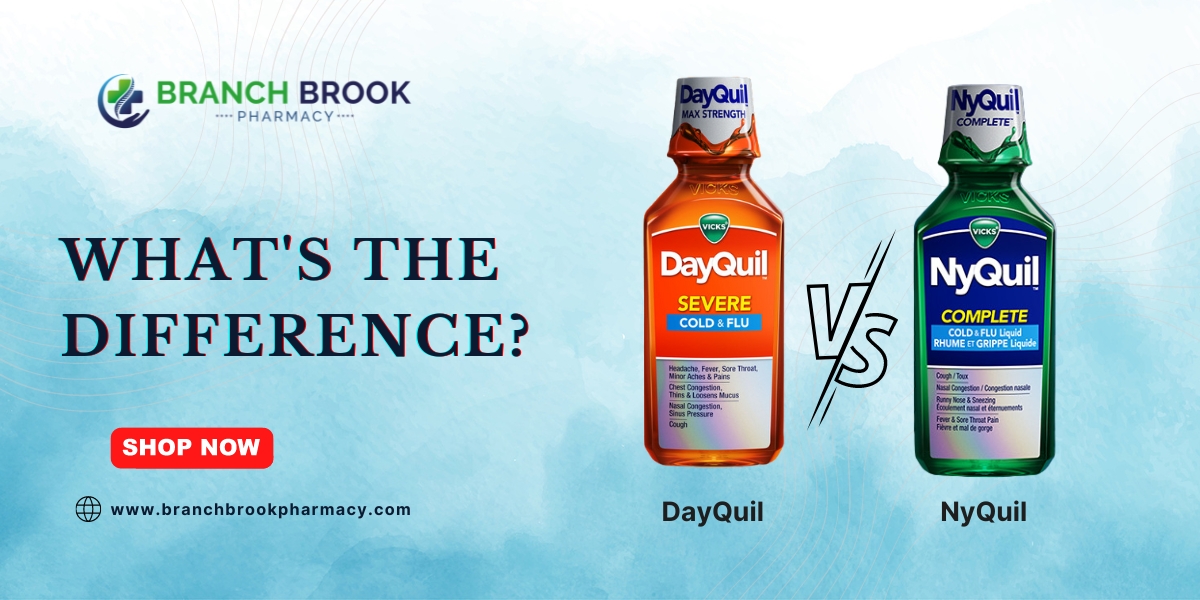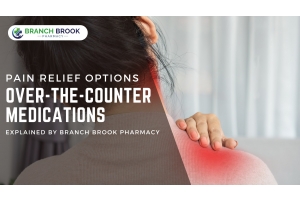DayQuil vs NyQuil: what's the difference?

Introduction
In spite of colds and the flu being quite common in day-to-day life, there are still some considerations to make when taking approved drugs. The two most commonly used alternatives to DayQuil are NyQuil and DayQuil. The two drugs are produced by Vicks, but their active ingredients are different and they can be used at different times of the day. It is therefore crucial to understand how these two medications differ. This will enable you to choose the one that will work best for you, based on your circumstances, symptoms, and time of day.
1. What is DayQuil?
DayQuil is a cold or flu remedy to alleviate cold and flu symptoms during the day. It comprises a combination of active substances, including phenylephrine, dextromethorphan, and the painkiller and fever reducer acetaminophen (a nasal decongestant). Together, these components help to reduce fever, congestion, and coughing. This drug has several different dosage forms, including liquid, gel caps, and liquicaps.
Depending on the drug form used, a different DayQuil dosage is advised. Liquicaps should be taken as 2 capsules every 4-6 hours, while liquid and gel cap formulations should be taken as 30 mL (2 tablespoons) every 4-6 hours. As I mentioned earlier, even if we may be familiar with generic medications, it's crucial to adhere to the dosage recommendations on the container. This is in accordance with the instructions of a healthcare provider.
2. What is NyQuil?
NyQuil is an over-the-counter drug intended to treat cold and flu symptoms at night. Acetaminophen (a painkiller and fever reducer), dextromethorphan (a cough suppressant), and doxylamine succinate are some of the active chemicals present (an antihistamine that causes drowsiness). Together, these components aid in promoting sleep while easing symptoms, including coughing, congestion, and fever. Liquid, gel, and liquicap versions of NyQuil are among the different dosage forms offered.
Depending on the medication's type, different doses of NyQuil are advised. Liquicaps should be taken in doses of 2 capsules every 6 hours, while liquid and gel cap formulations should be taken in doses of 30 mL (2 tablespoons) every 6 hours. It's crucial to adhere to the dosage recommendations on the container or as a healthcare provider advises.
3. Key differences between DayQuil and NyQuil
Now let us compare and contrast and identify their key differences. Their respective active components are the primary distinction between DayQuil and NyQuil. Acetaminophen and dextromethorphan are present in both drugs, but NyQuil also includes the drowsy antihistamine doxylamine succinate. Because of that, NyQuil is a preferable option for use at night since it may aid in promoting sleep. Further, the nasal decongestant phenylephrine, which is absent from NyQuil, is another difference between the two medications.
When we compare the guidelines for using DayQuil and NyQuil, that's another significant distinction. NyQuil is intended for use at night. While DayQuil is specifically developed to treat cold and flu symptoms throughout the day. DayQuil is recommended, though, to remain alert throughout the day. On the other hand, NyQuil might be a better choice if you need a decent night's sleep because of its drowsy properties.
DayQuil and NyQuil have been proven useful in easing common cold and flu symptoms. But NyQuil may work better at treating symptoms like coughing and congestion at night because it contains an antihistamine that might make you drowsy.
Now that we have looked at the bright side of the story, there is always a darker side to any medication: its side effects. DayQuil and NyQuil may cause negative effects, just like any other medicine. Drowsiness, dizziness, and an upset stomach are the most common side effects of both drugs. Adhering to the dosage recommendations on the container can reduce the likelihood of having these adverse effects.
4. When to use DayQuil or NyQuil?
There are several things to consider while deciding between DayQuil and NyQuil. Once you know the substance's characteristics and post-ingestion effects, you may make your own decisions. DayQuil is perhaps a better choice if you need to remain alert and focused during the day because it doesn't contain any ingredients that make you feel drowsy. NyQuil, on the other hand, might be a more suitable option if you need to get a decent night's sleep. This is because of its drowsy properties brought on by the antihistamine that is present in it. It's crucial to take into account your particular symptoms. DayQuil contains a nasal decongestant, so it might be a better choice if you're congested. Both medicines may be useful for symptoms like a cough or a fever.
Before taking any medicine, it's crucial to consult with a healthcare provider, especially if you have any underlying medical conditions or are already taking other prescriptions. You can get assistance from a medical expert in choosing the right drug to meet your individual requirements.
5. Precautions and warnings
When using DayQuil or NyQuil, several warnings and precautions must be considered. It's crucial to adhere to the dosage recommendations on the container or as advised by a healthcare provider when taking any drug. Both medications have substantial negative effects, including liver damage, if taken in excess.
Both DayQuil and NyQuil may interact with prescription, over-the-counter, herbal supplements, and other drugs. If you are on any other medications, you must see a healthcare provider before taking any medication.
Certain populations, including those who are pregnant or nursing, children under the age of 12, and people with specific medical conditions, are not advised to use either medicine. If you fit these descriptions, you must consult a medical expert before using any medicine.
Conclusion:
To conclude all that we have learned, DayQuil and NyQuil are two popular medications designed to relieve cold and flu symptoms. While the target medical condition is the same, the time at which these medications should be consumed is different. DayQuil does not have any antihistamines, so it keeps you alert and is recommended to be taken during the day. NyQuil, on the other hand, contains an antihistamine that makes you drowsy, so it would help you sleep better at night. Reversing or swapping the course of both medications may lead to accidents. If you get drowsy during the day after taking NyQuil, you lose your reflexes, resulting in many unexplainable accidents.
While both medications contain acetaminophen and dextromethorphan, their active ingredients, indications for use, and side effects differ. So though you have gained some knowledge concerning these medications, meeting and consulting a medical professional for the proper dosage is still recommended, given your medical conditions or history. If you follow the dosage instructions and take the necessary precautions, you will be able to effectively manage your cold and flu symptoms and feel better sooner.
Follow us at https://branchbrookpharmacy.com/Blog for more information about our OTC offers and interesting drug facts.
Also Read: First-Aid Products Recommended by Pharmacists - Branch brook Pharmacy










